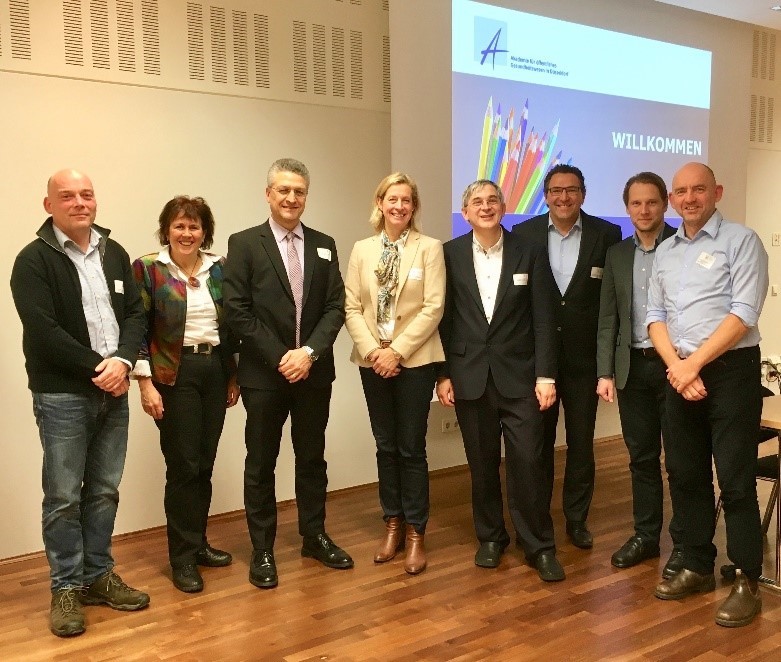Organised by the Academy for Public Health Düsseldorf and the National Research Platform for Zoonoses, the workshop "Bon Appétit One Health - Food-borne Diseases caused by Zoonoses" took place on 28 November 2017 in the event rooms of the Academy in Düsseldorf.
Campylobacter, E. coli and Listeria - each pathogen makes its own demands on science and public health services (ÖGD)
The program was conducted on selected zoonotic pathogens such as Campylobacter, Escherichia coli and Listeria and highlighted current challenges in science and health care. Prof. Dr. Thomas Alter (Department of Veterinary Medicine of the Free University of Berlin) introduced the topic of Campylobacter. He explained that the number of Campylobacter infections has increased in recent years, unlike Salmonella, and that this is also due to improved diagnostics and changes in the reporting system. The challenge of effective control and prevention would remain a highly topical issue, also for the future.
Dr. Annelene Kossow from the Institute for Hygiene of the University Hospital Münster reported on the current state of knowledge on Escherichia coli - bacteria as food-borne zoonotic agents. She focused on the recent EHEC outbreak in North Rhine-Westphalia, Lower Saxony, Berlin and Bremen, which took place from December 2016 to March 2017, and highlighted the great opportunities of new diagnostic methods such as Next Generation Sequencing (NGS) in the detection and control of such outbreaks.
Following this presentation, Dr. Sven Halbedel from the Robert Koch Institute described the bacterium Listeria and its versatility. It should be emphasized that Listeria have a very high tenacity and can multiply even at temperatures around 4 degrees Celsius and in (moderately) acidic environments. In the host, due to their preference for a particular receptor combination, they possess tropism for the liver, placenta and brain, which is responsible for the severity of the diseases. Since the treatment of listeriosis is complex, Dr. Halbedel also discussed the therapeutic options. As a solution, he presented an approach for improved listeriosis management, which consists of two building blocks: 1. molecular surveillance for outbreak detection and 2. investigation of genetic factors of listeria for b-lactam tolerance in order to find new starting points for more effective antibiotics.
Challenges in public health services are many and varied
After the lunch break, Dr. Bornhofen from the Offenbach Health Office presented the current challenges in the everyday life of a health authority. He explained the complexity of the reporting procedures and the outbreak management that health authorities have to carry out every day with fewer and fewer staff, among many other tasks. A particular challenge here is to clearly identify rare events and to circumvent all possible problems quickly and reliably. Numerous factors play a role here, such as the time delay until patients go to the doctor, the duration of laboratory examinations, reporting processes, missing retained samples, etc., until an outbreak can be recognised as such and then successfully combated. In conclusion, he says that public health authorities could play an indirect role in combating food-borne diseases.
Dr. Friebertshäuser from the Health Services Hochtaunuskreis represented both aspects of the health service as head of an office that combines the veterinary and the health office in one house. Using illustrative examples from the veterinary and food sectors, she emphasized the importance of cooperation between all three areas - veterinary, health and food - and the advantages of sharing information between them and knowing the work procedures of the other areas of the authorities. At the same time, she stressed the importance of knowledge of legal issues and the importance of formalities in the food sector. Using the example of the amended restaurant ordinance in Hesse, she explained what effects official regulations or their amendments can have on everyday life and the probability of infection for the population.
One Health also means cooperation
The lectures were concluded with the "Bridge One Health" by Prof. Dr. Wieler, President of the Robert Koch Institute (RKI). He emphasised the great added value of the cooperation of several Federal Ministries under the keyword zoonoses since 2006 - with the visible success story of the Zoonoses Platform as one output of this cooperation. Mr. Wieler also presented the RKI Strategic Plan 2025, in which the topic "One Health" is one of six relevant topics. As an example of a real One Health approach in recent years, the reduction of salmonella infections in Germany was highlighted. This success was achieved primarily through the vaccination of chickens. Interdisciplinary work is also from the point of view of the RKI an essential element in order to be able to continue to control zoonoses successfully in the future.

The speakers at the event: Prof. Dr. Thomas Alter, Dr. Ute Teichert, Prof. Dr. Lothar Wieler, Dr. Britt Friebertshäuser, Dr. Bernhard Bornhofen, Prof. Dr. Stephan Ludwig, Dr. Sven Halbedel, Dr. Peter Tinnemann (from left)
Between the individual presentations and in the final discussion there was much discussion. In addition to technical questions, the discussion also focused on the great importance of early and complete infection reports from doctors and authorities, the high number of undetected cases of infection due to missed diagnostics, and the question of how diagnostics can be accelerated so that dangerous foods can actually disappear from the shelves in time?
It was pointed out that in the case of food-borne zoonoses, close cooperation between the public health department, veterinary office and food monitoring is essential and that the described event format should be continued continuously and include closer cooperation with human medicine.



